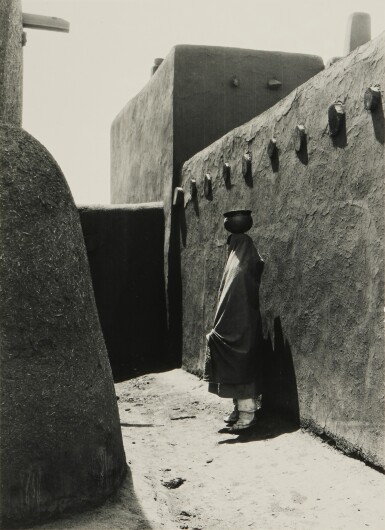
Property Sold To Benefit The Helene Wurlitzer Foundation Of New Mexico
Ansel Adams
At Taos Pueblo
Lot Closed
May 24, 05:58 PM GMT
Estimate
15,000 - 25,000 USD
Lot Details
Description
Property Sold To Benefit The Helene Wurlitzer Foundation Of New Mexico
Ansel Adams
1902 - 1984
At Taos Pueblo
signed Ansel Adams (on the mount); signed Ansel Adams, titled At Taos Pueblo, and dated 1929 (on the reverse)
gelatin silver print, mounted
9 by 6 ½ in.
22.9 by 16.5 cm.
Executed in 1929 and probably printed in the early 1940s.
Helene Wurlitzer, Taos (acquired directly from the artist)
Acquired by bequest from the above circa 1963 by the present owner
The photographs in Lots 1029, 1032, 1033, 1035, 1037, 1053, 1055, 1057, 1059, and 1061 come from the collection of The Helene Wurlitzer Foundation of New Mexico. They perfectly encapsulate Ansel Adams’ relationship with the Southwest – from the images made in the late 1920s during his first visits to Taos Pueblo and his work done in the 1940s for the United States Department of the Interior (see lots 1032, 1035, 1053), to his iconic view of Moonrise, Hernandez, New Mexico (see lot 1029). Each photograph is a prime example of Adams’ painstaking process in the darkroom and the care with which he undertook mounting and signing his finished fine prints.
When Adams visited New Mexico for the first time in 1927, he could not have foreseen the profound impact the region would have on his career. During one of his early visits to Taos, he wrote to his future wife Virginia: “This is the most completely beautiful place I have ever seen. A marvelous snowy range of mountains rises from a spacious emerald plain and this little old world village nestles close to the hills. Adobe – bells – color beyond imagination – and today, the heavens are filled with clouds.”
Over the ensuing four decades, Adams returned to New Mexico regularly for extended lengths of time. Every trip brought with it a newfound appreciation for its landscape, culture, and architecture, made more evident in each subsequent body of work. As William Turnage, the longtime Managing Trustee of the Ansel Adams Publishing Rights Trust, rightfully noted, “It would be difficult to imagine that many Americans, between 1927 and 1961, drove more miles on the bad and back roads of the Southwest than Ansel Adams – and doubtful that any American expressed a visual resonance with the region as deeply convincing.”
You May Also Like



